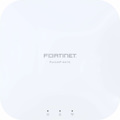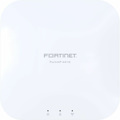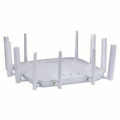- General Information
- Manufacturer
- SonicWall Inc.
- Manufacturer Website Address
- http://www.sonicwall.com
- Brand Name
- SonicWall
- Product Line
- SonicWave
- Product Series
- 600
- Packaged Quantity
- 8
- Product Type
- Wireless Access Point
SonicWall's 600 Series Wireless Access Points (APs) use 802.11ax - the most advanced technology available - for superior performance in complex, multi-device environments. Cloud-managed using SonicWall's Wireless Network Manager (WNM), these APs offer a number of additional features that provide an enhanced experience, all while delivering the best-in-class security that you expect from SonicWall.
Performance
SonicWall's SonicWave 600 Series Access Points utilize 802.11ax technology, improving performance in complex environments. The use of 1024 QAM allows more data to pass through, and 802.11ax provides enhancements in MU-MIMO, with both uplink and downlink capabilities. Additionally, 802.11ax works in both the 2.4 GHz and 5 GHz bands. Testing has shown that 802.11ax can reduce latency by 75% and enable up to a 4X improvement in overall throughput, with nominal data rate improvement of up to 37% compared to 802.11ac Wave 2.
Enhanced user experience
SonicWave APs enhance the user experience in a number of ways. Not only are processor speeds faster, but beamforming allows for a more direct connection that is faster and more reliable than without beamforming. Improved power control methods help to avoid interference with nearby networks, making for a better experience. And Target Wake Time management helps preserve battery life in mobile devices.
Best-in-class wireless security
Most SonicWave access points include a separate radio dedicated to security, which performs rogue AP detection, passive scanning and packet capturing. The SonicWave solution also integrates additional securityrelated features, including wireless intrusion detection and prevention, virtual AP segmentation, wireless guest services,
RF monitoring and wireless packet capture. SonicWave APs also feature zero-wait DFS, which identifies and avoids interference with radar systems while eliminating the wait associated with being booted from one DFS channel and finding another to connect with.
Intuitive cloud management and monitoring tool
SonicWave APs are easy to set up and deploy. They integrate with SonicWall Wireless Network Manager, which is a highly intuitive, scalable and centralized Wi-Fi network management system capable of delivering rich wireless and switching analytics, as well as simplified, single-pane-ofglass onboarding via the cloud. The APs also integrate with WiFi Planner, a site survey tool that enables you to optimally design and deploy a wireless network, resulting in a reduced total cost of ownership. And with RF spectrum analysis, you can detect and identify the source of RF interference and monitor the health of a wireless system.
Zero-Touch Deployment
Zero-Touch makes it easy to register your unit and onboard SonicWave APs with the help of the SonicWall SonicExpress mobile app. The APs are automatically detected and provisioned with Zero-Touch Deployment. Available on iOS and Android, the SonicExpress mobile app lets network administrators monitor and manage networks from anywhere.
- Technical Information
- Wireless LAN Standard
- IEEE 802.11 a/b/g/n/ac/ax/e/i/r/k/v/w
- Bluetooth Standard
- Bluetooth 5
- Network Band
- Dual Band
- Frequency Band
- 2.40 GHz
- 5 GHz
- Total Number of Antennas
- 8
- Number of Internal Antennas
- 8
- Indoor/Outdoor
- Indoor
- Wireless Transmission Speed
- 4.80 Mbit/s
- MIMO Technology
- Yes
- MIMO Type
- Multi User MIMO
- Beamforming Technology
- Yes
- Data Encryption
- Yes
- Encryption Standard
- WPA3
- WPA2
- AES
- WPA2-ENT
- High Availability Supported
- Yes
- Interfaces/Ports
- Ethernet Technology
- 2.5 Gigabit Ethernet
- Gigabit Ethernet
- Number of Network (RJ-45) Ports
- 1
- PoE PD Port
- Yes
- USB
- Yes
- USB Standard
- USB 3.0
- Management Port
- Yes
- Network & Communication
- Wi-Fi Generation
- Wi-Fi 6
- Communication Protocols
- RADIUS
- SSL
- Power Description
- Power Consumption
- 23 W
- Physical Characteristics
- Form Factor
- Ceiling Mountable
- Antenna Form Factor
- Internal
- Height
- 7.9"
- Width
- 7.9"
- Depth
- 1.5"
- Weight (Approximate)
- 1.87 lb
- Miscellaneous
- Package Contents
- SonicWave 641 Wireless Access Point
- Ceiling Mounting Kit
- Certifications & Standards
- UL
- cUL
- TUV/GS
- CB
- CE
- BSMI
- Mexico CoC
- 802.3at
- 802.3bz
- FCC/ICES Class B
- RCM/ACMA
- VCCI Class B
- TELEC
- NCC
- MSIP
- ANATEL
- Customs Union
- UL E211396
- UL 62368-1
- UL 60950-1 cUL CAN/CSA C22.2 No. 62368-1-14
- CAN/CSA C22.2 No. 62368-1-14
- EN 60950-1 Or EN 62368-1
- IEC 60950-1
- IEC 62368-1
- Europe: EN 60950-1
- EN 62368-1
- USA: FCC P15B
- Canada: ICES-003
- Europe: EN 301 489-1, -17
- EN 55032
- EN 55024
- Aus/NZ: CISPR 32
- Japan: VCCI
- Taiwan: CNS 13438
- USA: FCC Part 2
- Canada: RSS-102
- Europe: EN 50385
- Aus/Nz: ASNZS 2772
- Taiwan: CNS 1336-1
- Environmentally Friendly
- Yes
- Environmental Compliance
- China Restriction of Hazardous Substances (China RoHS)
- Restriction of Hazardous Substances (RoHS)
- Waste Electrical and Electronic Equipment Directive (WEEE)









